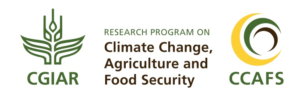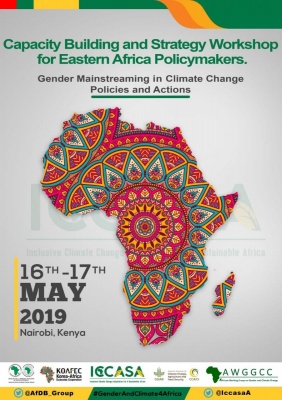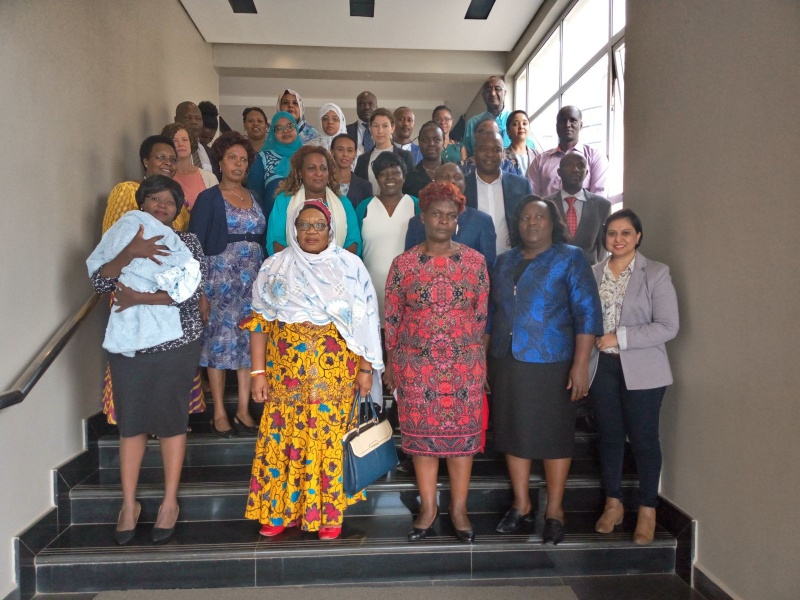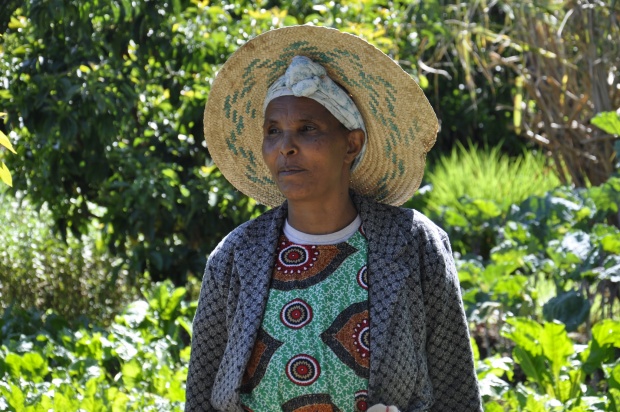 Article in collaboration with: CGIAR Research Program on Climate Change, Agriculture and Food Security (CCAFS) seeks to address the increasing challenge of global warming and declining food security on agricultural practices, policies and measures through strategic, broad-based global partnerships.
Article in collaboration with: CGIAR Research Program on Climate Change, Agriculture and Food Security (CCAFS) seeks to address the increasing challenge of global warming and declining food security on agricultural practices, policies and measures through strategic, broad-based global partnerships.
Policy makers from nine East African countries pledge to lobby governments and policy influencers to consider gender mainstreaming in national climate change policies.
A workshop on gender mainstreaming in East African climate change policies took place between 16 and 17 May 2019 in Nairobi, Kenya. The workshop was organized by the African Development Bank Group (AfDB) through its Inclusive Climate Change Adaptation for a Sustainable Africa (ICCASA) project and was funded by the Korea-African Economic Corporation (KOAFEC).

AfDB is implementing several interventions in line with their Ten-Year Strategy, High 5 Priority Areas, Gender Strategy and Second Climate Change Action Plan, with a focus on increasing inclusivity and ensuring sustainable development. During the two-day capacity building and strategy meeting, policy makers from Ethiopia, Tanzania, Burundi, Comoros, Kenya, Djibouti, Eritrea, Uganda and Sudan were represented.
Related topics: Connections That Matter: Climate Change and Gender Equality – Gender equity: A snail pace progress and how to change that
The participants committed to work with their fellow policy makers to do the following:
- Parliamentary engagement to raise awareness of gender mainstreaming in climate change actions and policies. With this knowledge, parliamentarians can scrutinize climate change-related legislation and assess government responses to gender and climate change issues, supported by appropriate gender-responsive budget allocation.
- Capacity building for policy makers to develop skills, knowledge and tools to mainstream gender and empower women in climate change actions and policies. Capacity building also enables policymakers to identify entry points for gender-responsive action and determine which actions are appropriate.
- Developing and implementing national gender action plans (GAP) to guide the creation of gender responsive climate policies and actions, while acknowledging the critical contributions of women to achieving climate resilience. The GAP will be designed to fit national contexts, priorities and will align with existing climate change legislation.
Burundi representative Prudence Bizimana noted that gender features prominently in the country’s policies. Implementation, however, will require continued work. Madam Fatma Toufiq, a Member of Parliament in Tanzania, also noted the crucial need for African policymakers to meet often in order to share lessons learned and support each other in gender and climate change issues.

Representatives from East African countries met in Nairobi to discuss and plan for gender mainstreaming in climate change adaptation. Photo: Faith Gikuna (ICCASA)
George Wamukoya of the African Working Group on Gender and Climate Change (AWGGCC), a key ICCASA project partner, cited a number of significant efforts to mainstream gender into national climate change action plans and policies, Nationally Determined Contributions (NDCs), National Adaptation Plans (NAPs), Reducing Emissions from Deforestation and Degradation (REDD+), and National Communications (NC). He further stated that, regardless of all this remarkable progress in aligning gender and climate change, there are still enormous opportunities that need to be maximized to ensure gender is mainstreamed.
Ugandan participant Anastasia Munsana observed gender mainstreaming in national policies by designing gender sensitive projects, such as addressing adoption barriers for improved charcoal production technologies and sustainable land management.
Despite the enormous efforts of various countries, a gender mainstreaming gap remains in national policies. Participants highlighted the hope for Africa to achieve maximum gender mainstreaming in NDCs, NAPs, NAMAs and other commitments to equitably combat the effects of climate change.
About the author: Mary Nyasimi is the Gender and Climate Change Advisor for the Inclusive Climate Change Adaptation for a Sustainable Africa (ICCASA) project. Dana Elhassan is Senior Gender Specialist for the African Development Bank. Faith Gikunda is Communications Specialist for the ICCASA project.
EDITOR’S NOTE: The opinions expressed here by Impakter.com columnists are their own, not those of Impakter.com. Photo Credit: G. Ambaw (CCAFS)









